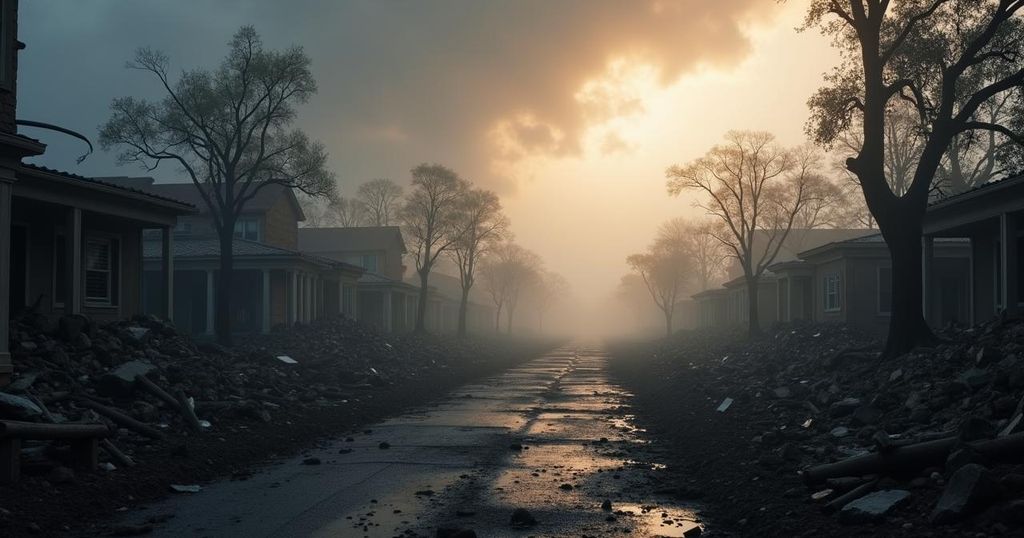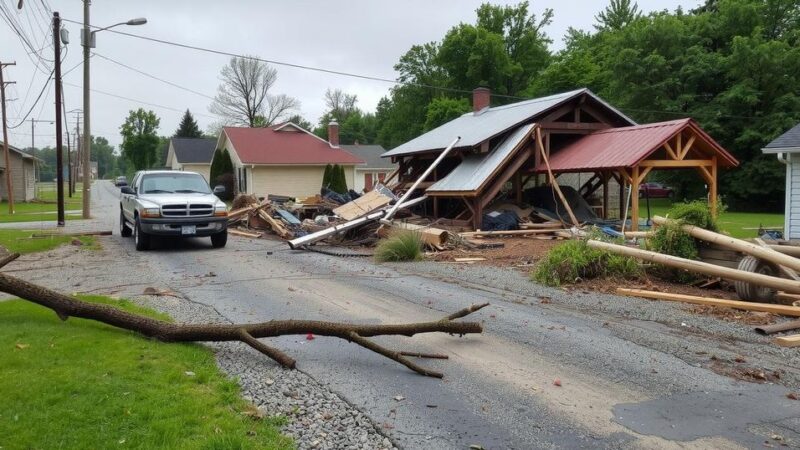Hurricane Helene has caused at least 213 deaths and widespread destruction across the U.S. Gulf Coast to Virginia. The search for missing persons continues amid challenging recovery efforts, while communities come together to support one another despite severe infrastructure damage and a lack of resources for recovery.
In the aftermath of Hurricane Helene, which made landfall in Florida and caused widespread destruction from the Gulf Coast to Virginia, the human toll has risen dramatically, with at least 213 fatalities reported. The storm’s devastation has left numerous families mourning lost loved ones, while many others remain unaccounted for. The search for missing individuals intensifies daily, obstructed by damaged infrastructure and communication failures. Reports indicate that in Buncombe County, North Carolina, over 200 residents are still missing and 72 confirmed dead. The extent of the destruction is gradually coming into focus as residents return to their neighborhoods, only to find their homes destroyed or significantly damaged. One couple from Swannanoa recounted their harrowing escape from rising floodwaters, stating, “We lost just about everything we owned, and that included vehicles. But we have the most important thing: our lives. And we are forever and always going to be thankful for that.” Helene has been noted as the deadliest hurricane to strike the continental United States since Hurricane Katrina in 2005. In North Carolina, where the storm’s impact is most pronounced with 106 reported fatalities, combined state numbers reveal 41 casualties in South Carolina, 33 in Georgia, 20 in Florida, 11 in Tennessee, and two in Virginia. Efforts are currently ongoing to restore essential services such as electricity and water; as of Thursday, over 700,000 customers remain without power in the United States. The devastation to transportation networks is being described as unprecedented, complicating relief efforts. Many roads are closed, leaving areas inaccessible and prompting creative delivery solutions for supplies, including aerial drops and transport by animal. Meanwhile, efforts to restore power and communication are paramount, as authorities stress that reconnecting families is critical to recovery. Federal assistance is being mobilized, with thousands from the National Guard activated for rescue and support missions. However, the Federal Emergency Management Agency (FEMA) is facing funding challenges as they provide immediate aid. While President Biden indicated immediate concerns for additional funding for disaster recovery, local businesses are bracing for the impact of limited funds from the Small Business Administration (SBA) and other support mechanisms. The SBA’s disaster loan program could be significantly affected due to inadequate funding. Amidst the chaos, communities have come together to assist one another. A remarkable incident unfolded when a wedding rehearsal evolved into a dramatic rescue operation, showcasing the resilience and solidarity of those affected. Ultimately, Hurricane Helene’s catastrophic impact serves as a sobering reminder of the vulnerability many face when natural disasters strike, illustrating the urgent need for effective disaster response and resource management.
Hurricane Helene struck the Gulf Coast of Florida over a week ago, leaving a path of destruction that affected several states along its route to Virginia. The storm has caused catastrophic loss of life, infrastructure damage, and has prompted extensive search and rescue operations. The aftermath has included challenges in accessing affected areas, restoring essential services, and a critical need for immediate financial aid to support recovery efforts. As FEMA and other agencies mobilize resources, local communities are coming together to support one another during this devastating time.
In conclusion, Hurricane Helene’s devastation has resulted in significant loss of life and destruction across multiple states. As local authorities and federal agencies work tirelessly to restore infrastructure and provide support, the resilience of communities shines through in their collective efforts to aid one another. Nonetheless, concerns regarding funding and resource allocation for recovery remain pressing, necessitating ongoing attention and support from all levels of government.
Original Source: www.cnn.com







